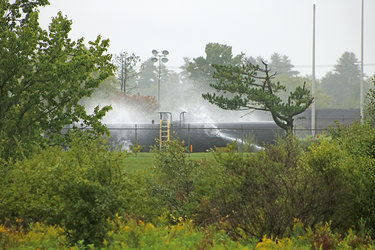SABIC penalized for 2020 styrene leak
BETHLEHEM — The state is holding SABIC Innovative Plastics in Selkirk accountable for an incident in September 2020 when a dangerous chemical, styrene, escaped from a railcar, the commissioner of environmental conservation, Basil Seggos, announced on Wednesday.
“These enforcement actions include a substantial penalty and require SABIC to improve its operations to protect the surrounding community and the environment from further violations and prevent future emergencies,” Seggos said in a release, announcing the sanctions.
SABIC will have to pay $322,400 in penalties and make facility improvements.
SABIC (Saudi Arabian Basic Industries Company) is a chemical manufacturing company owned by the Saudi Arabian government. It was formed, by royal decree, in 1976 to convert oil byproducts into fertilizers, polymers, and chemicals.
According to the federal Environmental Protection Agency, in humans, acute or short-term exposure to styrene results in mucous membrane and eye irritation, and gastrointestinal effects. Chronic or long-term exposure to styrene results in effects on the central nervous system, such as headache, fatigue, weakness, and depression; nervous-system dysfunction; hearing loss; and peripheral neuropathy.
After a recent exposure, laboratory tests can determine styrene by measuring the breakdown products in a person’s urine, according to the EPA.
The incident
At 6:04 a.m. on Tuesday, Sept. 1, 2020, SABIC called Bethlehem Police to report a styrene monomer had been released. The hazardous chemical additive is used in plastic manufacturing. People as far afield as Guilderland Center and Berne reported smelling the chemical.
At the time of the leak, Scott Dansey, a senior staff member for SABIC, said, “The initial incident that occurred yesterday was a venting of the rail car through a relief vent.” A rail car can hold about 180,000 pounds of liquid styrene; at the stationary rail car in Selkirk, the styrene monomer was vaporized through the relief valve, said Dansey.
In addition to local police and medical staff, people from state and federal agencies descended on the scene.
Hazardous-materials technicians worked “all night through the night on the rail car,” said Bethlehem Police Commander Adam Hornick at the time.
“Through the efforts of our on-site hazardous materials technicians, we were able to secure the rail car, remove pressure from the rail car, which was the big goal … It has significantly reduced the risk to the environment and the community,” said Dansey at the time, expressing a “deep apology” to the community.
Dansey would not answer questions on how long the affected rail car had stood at the site, on how high the temperature inside the car had gotten, on how much styrene was in the car to begin with nor on how much remained in the car.
The penalties
The DEC release on Wednesday said the 2020 incident at the SABIC plastics manufacturing facility released about 22,057 pounds of styrene vapor to the environment, threatening public health and safety.
“Styrene vapor was released from a railcar through its pressure relief valve and manway into the atmosphere … which required multiple road closures, a shelter-in-place order for the public within a mile radius, and a public evacuation order within one-half mile of the facility,” the release said.
The DEC’s investigation of the incident “revealed improper handling and storage of hazardous substances, improper maintenance and repair of the railcar, violations of air pollution regulations, and an unauthorized release of a hazardous substance,” the DEC said.
In addition, the DEC’s inspection found an additional 29 violations of the facility’s Air Title V permit, unrelated to the styrene release.
Two Orders on Consent address all violations from the styrene release event, as well as the additional air-permit violations.
To help prevent future incidents, DEC’s Orders on Consent require SABIC to undertake a comprehensive third-party audit of the facility’s hazardous substance management and to develop recommendations for DEC staff review, and to develop new operating procedures and employee training protocols.
